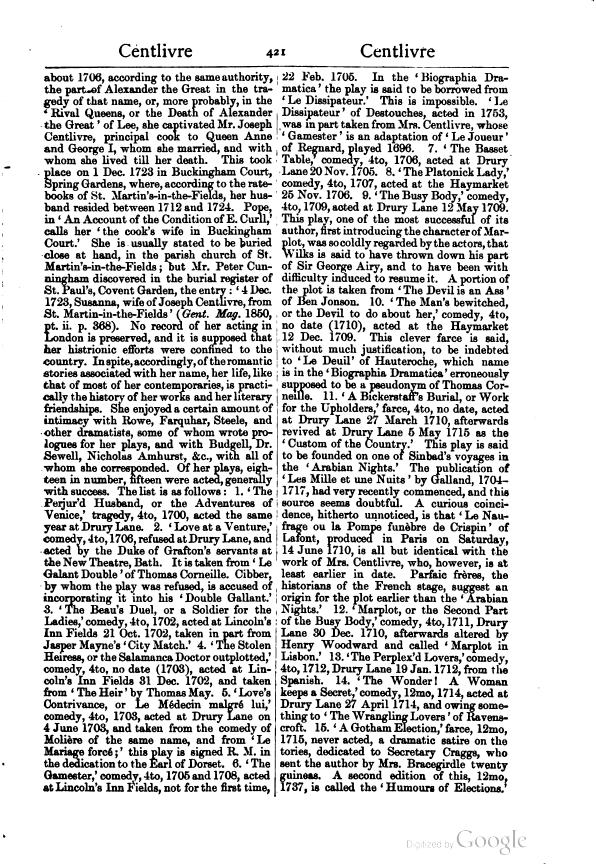about 1706, according to the same authority, the part of Alexander the Great in the tragedy of that name, or, more probably, in the ‘Rival Queens, or the Death of Alexander the Great’ of Lee, she captivated Mr. Joseph Centlivre, principal cook to Queen Anne and George I, whom she married, and with whom she lived till her death. This took place on 1 Dec. 1723 in Buckingham Court, Spring Gardens, where, according to the rate-books of St. Martin's-in-the-Fields, her husband resided between 1712 and 1724. Pope, in ‘An Account of the Condition of E. Curll,’ calls her ‘the cook's wife in Buckingham Court.’ She is usually stated to be buried close at hand, in the parish church of St. Martin's-in-the-Fields; but Mr. Peter Cunningham discovered in the burial register of St. Paul's, Covent Garden, the entry: ‘4 Dec. 1723, Susanna, wife of Joseph Centlivre, from St. Martin-in-the-Fields’ (Gent. Mag. 1850, pt. ii. p. 368). No record of her acting in London is preserved, and it is supposed that her histrionic efforts were confined to the country. In spite, accordingly, of the romantic stories associated with her name, her life, like that of most of her contemporaries, is practically the history of her works and her literary friendships. She enjoyed a certain amount of intimacy with Rowe, Farquhar, Steele, and other dramatists, some of whom wrote prologues for her plays, and with Budgell, Dr. Sewell, Nicholas Amhurst, &c., with all of whom she corresponded. Of her plays, nineteen in number, fifteen were acted, generally with success. The list is as follows: 1. ‘The Perjur'd Husband, or the Adventures of Venice,’ tragedy, 4to, 1700, acted the same year at Drury Lane. 2. ‘Love at a Venture,’ comedy, 4to, 1706, refused at Drury Lane, and acted by the Duke of Grafton's servants at the New Theatre, Bath. It is taken from ‘Le Galant Double’ of Thomas Corneille. Cibber, by whom the play was refused, is accused of incorporating it into his ‘Double Gallant.’ 3. ‘The Beau's Duel, or a Soldier for the Ladies,’ comedy, 4to, 1702, acted at Lincoln's Inn Fields 21 Oct. 1702, taken in part from Jasper Mayne's ‘City Match.’ 4. ‘The Stolen Heiress, or the Salamanca Doctor outplotted,’ comedy, 4to, no date (1703), acted at Lincoln's Inn Fields 31 Dec. 1702, and taken from ‘The Heir’ by Thomas May. 5. ‘Love's Contrivance, or Le Médecin malgré lui,’ comedy, 4to, 1703, acted at Drury Lane on 4 June 1703, and taken from the comedy of Molière of the same name, and from ‘Le Mariage forcé;’ this play is signed R. M. in the dedication to the Earl of Dorset. 6. ‘The Gamester,’ comedy, 4to, 1705 and 1708, acted at Lincoln's Inn Fields, not for the first time, 22 Feb. 1705. In the ‘Biographia Dramatica’ the play is said to be borrowed from ‘Le Dissipateur.’ This is impossible. ‘Le Dissipateur’ of Destouches, acted in 1753, was in part taken from Mrs. Centlivre, whose ‘Gamester’ is an adaptation of ‘Le Joueur’ of Regnard, played 1696. 7. ‘The Basset Table,’ comedy, 4to, 1706, acted at Drury Lane 20 Nov. 1705. 8. ‘The Platonick Lady,’ comedy, 4to, 1707, acted at the Haymarket 25 Nov. 1706. 9. ‘The Busy Body,’ comedy, 4to, 1709, acted at Drury Lane 12 May 1709. This play, one of the most successful of its author, first introducing the character of Marplot, was so coldly regarded by the actors, that Wilks is said to have thrown down his part of Sir George Airy, and to have been with difficulty induced to resume it. A portion of the plot is taken from ‘The Devil is an Ass’ of Ben Jonson. 10. ‘The Man's bewitched, or the Devil to do about her,’ comedy, 4to, no date (1710), acted at the Haymarket 12 Dec. 1709. This clever farce is said, without much justification, to be indebted to ‘Le Deuil’ of Hauteroche, which name is in the ‘Biographia Dramatica’ erroneously supposed to be a pseudonym of Thomas Corneille. 11. ‘A Bickerstaff's Burial, or Work for the Upholders,’ farce, 4to, no date, acted at Drury Lane 27 March 1710, afterwards revived at Drury Lane 5 May 1715 as the ‘Custom of the Country.’ This play is said to be founded on one of Sinbad's voyages in the ‘Arabian Nights.’ The publication of ‘Les Mille et une Nuits’ by Galland, 1704–1717, had very recently commenced, and this source seems doubtful. A curious coincidence, hitherto unnoticed, is that ‘Le Naufrage ou la Pompe funèbre de Crispin’ of Lafont, produced in Paris on Saturday, 14 June 1710, is all but identical with the work of Mrs. Centlivre, who, however, is at least earlier in date. Parfaic frères, the historians of the French stage, suggest an origin for the plot earlier than the ‘Arabian Nights.’ 12. ‘Marplot, or the Second Part of the Busy Body,’ comedy, 4to, 1711, Drury Lane 30 Dec. 1710, afterwards altered by Henry Woodward and called ‘Marplot in Lisbon.’ 13. ‘The Perplex'd Lovers,’ comedy, 4to, 1712, Drury Lane 19 Jan. 1712, from the Spanish. 14. ‘The Wonder! A Woman keeps a Secret,’ comedy, 12mo, 1714, acted at Drury Lane 27 April 1714, and owing something to ‘The Wrangling Lovers’ of Ravenscroft. 15. ‘A Gotham Election,’ farce, 12mo, 1715, never acted, a dramatic satire on the tories, dedicated to Secretary Craggs, who sent the author by Mrs. Bracegirdle twenty guineas. A second edition of this, 12mo, 1737, is called the ‘Humours of Elections.’
